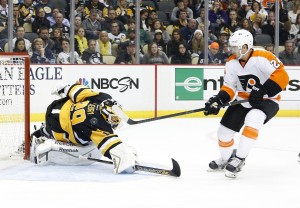
The Pittsburgh Penguins stink against their own division. In 27 games this season, Metropolitan teams have outscored Pittsburgh 85-62, and shut the team out four times. On Wednesday, in front of a national audience on home ice, the 2014 division champions lost to Philadelphia…again. Fans, who were extremely quiet most of the night — except when a pane of glass fell to the ice after a Chris Kunitz check in the second period — booed the team as it left the ice.
Pens booed off the ice. Thoroughly.
— Josh Yohe (@JoshYohe_Trib) April 2, 2015
Including the playoffs, the Flyers have been nearly flawless at Consol Energy Center, posting a 13-2-1 record since its opening. Head Coach Craig Berube’s postgame comments following his team’s 4-1 victory should leave nothing but a sour taste in the mouths of Penguins’ players, coaches and fans alike. Sure, the Penguins played with only 19 players after making Evgeni Malkin a late scratch; but, aside from Sidney Crosby and Patric Hornqvist, the team played a lackadaisical brand of hockey against a division foe…again. Pittsburgh played with five defensemen for a second consecutive game – during a playoff push, no less – and took careless, ill-timed penalties which set up the League’s third best power play. That’s an inexcusable way to exhaust limited resources this late in the season. Crosby, who scored his 300th career goal at 3:29 of the first period, said it best after the game.
“Because we’re understaffed doesn’t mean we can take five penalties,” Crosby explained. “We were bad.”

Trouble on the Horizon
The Penguins are in trouble, and the timing could not be worse. With five games remaining on the schedule, they face three teams from the Metropolitan Division, including the Flyers again on Sunday.
The road to the playoffs was once paved in Pittsburgh gold, but now the team’s future is uncertain.
It’s conceivable that when the Penguins head to Ottawa on April 7, it could be to battle for the final playoff spot in the Eastern Conference (See more detail from Mark Scheig).
The ninth-place Senators trail the wildcard-leading Penguins by only five points. Also, don’t look now, but the Bruins are two points back of the first wildcard spot.
If Pittsburgh backs into the playoffs, it has a 75-percent chance of facing a division opponent in the first round. The only way this does not happen is if the team remains in its current wildcard spot and gets penciled in for a date with either Montreal or Tampa Bay. Most likely, the Penguins will face the Islanders, Capitals or Rangers. Against those teams this season, Pittsburgh has been manhandled. They’ve been shut out three times, outscored 36-18, and earned a record of 3-7-2. Yikes.
Recent Penguins Posts:
[catlist categorypage=”yes” numberposts=3 excludeposts=this]
It’s All About the System
Most everyone in Pittsburgh wants to blame Mike Johnston and his new system for the Penguins’ recent struggles.
Since 2008, Pittsburgh has been the odds-on favorite to represent the Eastern Conference in the Stanley Cup Finals. Last season, its chances slimmed down slightly, but it was a favorite nonetheless. This season, many fans just hope the team can avoid being swept in the first round. Injuries and ailments to top players have hurt the Penguins this year far more than in years passed. In Dan Bylsma’s run-and-gun stretch-pass system, fast and skilled forwards dominated the regular season. Ray Shero equipped the organization with speed and star-power. Teams had trouble keeping up with Pittsburgh, thus they tripped, hooked and grabbed their ways into penalty trouble. No matter who the Penguins inserted into the lineup, the idea was the same…get the puck to the forwards quickly, and it worked very well…until April.
Johnston’s system requires a lot of practice, as it emphasizes team play. All five players set up, and move up the ice on breakouts in order to overwhelm the opposition.
When the Penguins were completely healthy, they dominated as a top-heavy unit. The power play was clicking at an incredible rate and every player contributed by playing responsible hockey. Passes were crisp, and shots were accurate. The system could not fail…until injuries came into play. After losing Pascal Dupuis and Olli Maatta for the season, the Penguins began to slip. Sidney Crosby, Evgeni Malkin, Patric Hornqvist, Christian Ehrhoff, Beau Bennett and Blake Comeau missed long stretches, and the lack of depth within the organization for this sort of system became very apparent. Take a look at the lines from Jan. 26:
#Pens lines at practice: Kunitz-Arcobello-Hornqvist Spaling-Sutter-Bennett Wilson-Goc-Downie Sill-Rust-Ebbett-Adams — Pittsburgh Penguins (@penguins) January 26, 2015
Jim Rutherford acquired some players; but, with little cap space, he could only do so much. Pittsburgh started losing at an unforeseeable rate, and the power play fell apart. Call-ups constantly found themselves out of position, and regulars made glaring mistakes because they were use to teammates being in specific places at a certain times. In order to succeed in such a system, line consistency is of utmost importance. Each time a player went down, the team took another step backward.
It was not always necessary to have the right players in the right positions in the Bylsma system, but it is a very important factor in Johnston’s. Though, the constant in both systems is that the team loses if players do not win battles. Instead of trying to outsmart teams, the Penguins need to outwork them. Depth certainly is a problem in Pittsburgh, but the team cannot win, even with a strong system in place, if it is unwilling to compete. Looking before passing is generally a better idea than following through on blind expectations. This system could very well in the playoffs, if everyone on the ice is on board. No matter who might get fan/media blame for this late-season slide and the poor play against division opponents, the players need to take responsibility.

Where Do the Penguins Go From Here?
Healthy or not, Pittsburgh has a tough road ahead. The team will enter the first round of the Stanley Cup Playoffs as an underdog for the first time since 2007, when Ottawa ousted it in five. The days of the Penguins skating circles in an unimpeded fashion around teams are over. It is vital to get in the right frame of mind over the next couple of weeks, or else another Metropolitan meltdown is sure to occur. The Islanders are extremely fast, while the Capitals are big. Both teams are loaded with talent. As for the division-champion Rangers? Well, they’re the most complete team in the Eastern Conference, if not the NHL. My guess is that all three teams salivate over the idea of playing Pittsburgh in the first round.
Systems aside, the players need to make better decisions on the ice. Coaches do not play the games…they simply advise and attempt to motivate. And, players get hurt. It’s expected in such a fast-paced, physically-demanding game. Good teams should at least compete, whether there are significant injuries or not. This recent slump against the division, and the rest of the NHL, is more about expecting to win because the team has talented superstars. The new NHL is more team-centric than ever before. As Herb Brooks said to the USA Men’s Hockey team in 1980, “you don’t have enough talent to win on talent alone.” Metropolitan teams know Pittsburgh has talent, yet they are not at all intimidated. As for blaming the officials, every team deals with the same referees. The Penguins need to quit asking for respect, and start earning it. Getting outscored 11-3 by non-playoff teams in the last three division games is unacceptable for a contender. For Pittsburgh, the playoffs start Saturday in Columbus.
The Blue Jackets have won eight consecutive games, and they would love to aid in keeping the Penguins from the postseason. There are only two ways to go from here, and one involves golf clubs. At this rate, tee time is scheduled for either April 15 or May 1. Do the Penguins have it in them to stay on the ice and away from the green? We will soon find out.